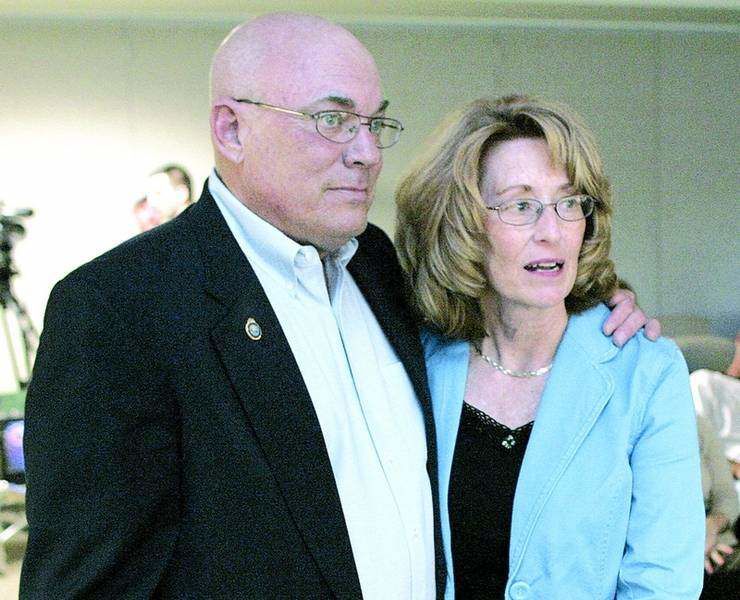Sheriff’s levy failing; Saxton, Kulongoski win
Published 5:00 am Wednesday, May 17, 2006

- Deschutes County Sheriff Les Stiles, with his wife, Carol, listens as Deschutes County Clerk Nancy Blankenship announces preliminary vote returns Tuesday night.
Deschutes County residents who didn’t vote in Tuesday’s election appear to have killed two ballot measures to permanently fund the sheriff’s office.
Most funding measures in Oregon, including the split-district taxing proposal to fund the sheriff’s office, are subject to a double majority rule. So, 50 percent of registered voters must cast a ballot and 50 percent of those must vote ”yes” to pass the measure.
That wasn’t happening as of 10 p.m. Tuesday, when Deschutes County Clerk Nancy Blankenship was still working through the ballot count. Though all the votes will still be counted, as required by Oregon law, it is unlikely the final returns will change the ballot measure.
Now Deschutes County Sheriff Les Stiles says he will return to the campaign trail, urging voters to support the permanent funding measures that will appear again on the November ballot.
And those measures won’t be subject to the double majority rule.
That’s because Oregon law exempts funding measures that appear in a general election, held in an even-numbered year, from the double majority requirement.
But Stiles said Tuesday night he made a strategic decision to go to the voters in May.
”We were the center of the sandwich instead of the crust,” Stiles said. ”We’ve known for a while it was unlikely to hit 50 percent but an incredibly complex issue has gotten more coverage than we ever could have hoped for in November.”
As things stand, Deschutes County residents vote on operating levies to fund the sheriff’s office every three years.
Different tax rates apply to urban and rural residents, and the levies fund about 67 percent of the sheriff’s office’s nearly $22 million budget.
The most recent levy expires in June 2007.
The passage of the permanent funding measures Tuesday would have meant the creation of two taxing districts – one countywide and one rural – to fund the sheriff’s office through 2021.
As of 10 p.m. Tuesday, 41.2 percent of voters in District 1, which included the entire county, had cast ballots. Of those, about 65 percent voted in favor of permanent funding.
District 2, which covered the same area as District 1 but excluded Bend, Redmond, Sisters, Sunriver and Black Butte Ranch, saw a 39.3 percent voter turnout by 10 p.m. Tuesday. The funding measure was supported by about 54 percent of those voters
Residents in District 2, who live in both districts, would have paid the tax rates for each one.
And some of those residents balked at a proposed 47 percent increase in their tax rate, from $1.60 per $1,000 in assessed property value to $2.35 per $1,000 of assessed property value, in the first year.
Had both districts passed, the sheriff would have gotten a jump in property tax revenue from the current $14 million to more than $20 million in fiscal year 2007-2008, said Jim Ross, business manager for the sheriff’s office.
The extra money was earmarked for additional personnel, increasing patrols and stepping up investigations as well as reopening a 90-bed work release center closed in 2003, Ross said. The added revenue also would have funded planning for the expansion of the Deschutes County jail.
”I could have started work toward opening the work release center tomorrow if the measures had passed,” Stiles said Tuesday night, awaiting election results at the Deschutes County Services Center. ”As soon as those doors opened, we could have stopped the forced release of inmates from the jail.”
Stiles said he had hopes for the passage of District 1, but suspected he was fighting an uphill battle in District 2.
The last sheriff’s levy approved by voters in 2004 passed in all but five precincts in Deschutes County. Four of those precincts were in La Pine.
Stiles said he has already begun looking forward, preparing for the June 2 filing deadline to get the permanent funding measures on the November ballot. Based on Tuesday’s returns, Stiles said he thinks the measures have a good chance of passing.
”That’s the best public opinion poll you can get, right there,” Stiles said, pointing to a projection screen with scrolling election results. ”The margin of error is zero percent.”
Should either district fail in November, Stiles said, his office will ask voters in that district to pass another temporary three-year operating levy in May 2007.
”If there were more ‘no’ votes than ‘yes’ votes I wouldn’t come back in November,” Stiles said. ”The good thing is that now the voters get it.”






